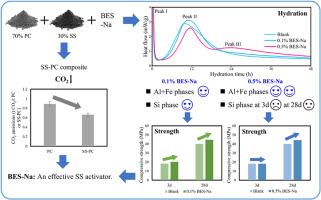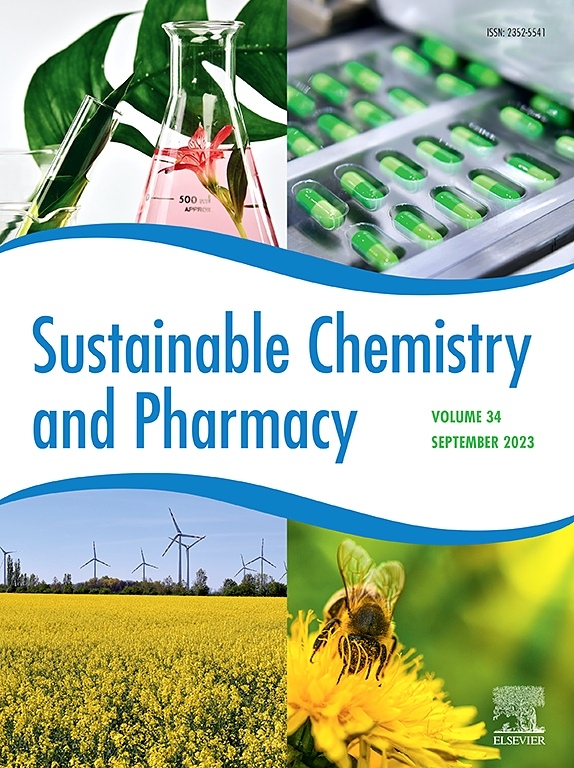Enhancing the hydration activity of steel slag-Portland cement composite by BES sodium activator
IF 5.8
2区 化学
Q2 CHEMISTRY, MULTIDISCIPLINARY
引用次数: 0
Abstract
The low hydration activity of steel slag (SS) limits its use in cement-based materials. The aim of this work was to explore the feasibility of N, N-bis(2-hydroxyethyl)-2-aminoethanesulfonic acid (BES) sodium as a novel activator in enhancing the hydration of SS-Portland cement (PC) (mass ratio of 3:7) composite. The compressive strength and hydration process of SS-PC composite and the working mechanism of BES sodium were systematically investigated. The results showed that at low dose (0.1 %), BES sodium significantly enhanced the 3–28 d compressive strengths by 2.1–4.6 MPa. This enhancement stemmed from the simultaneous acceleration of aluminates (C3A and C12A7), ferrites (C4AF and C2F), and silicates (C3S and β-C2S) hydration, and which facilitated the formation of ettringite (AFt), hemicarboaluminate (Hc), and C–S–H gels. At high dose (0.5 %), BES sodium did not affect the 3 d compressive strength and significantly increased the 7 and 28 d compressive strengths by 4.7 and 4.2 MPa. This was because the excessive acceleration of aluminates inhibited early silicates hydration. This inhibition gradually disappeared from 7 to 28 d. The activation mechanism involved BES sodium accelerated the dissolution and hydration of minerals via complexing to Ca2+, Al3+ and Fe3+, and its stronger complexation for Al3+ and Fe3+ explained the preferential acceleration for aluminates/ferrites. Crucially, using 0.1 % BES sodium can effectively reduce 0.221–0.234 tons of CO2/ton SS-PC under the premise of 28 d compressive strength more than 42.5 MPa. This highlighted the potential of BES sodium as an effective activator in improving SS utilization by enhancing SS hydration activity.

BES钠活化剂提高钢渣-硅酸盐水泥复合材料的水化活性
钢渣水化活性低,限制了其在水泥基材料中的应用。本文旨在探讨N, N-双(2-羟乙基)-2-氨基乙磺酸(BES)钠作为新型活化剂促进质量比为3:7的ss -硅酸盐水泥(PC)复合材料水化的可行性。系统研究了SS-PC复合材料的抗压强度和水化过程,以及BES钠的作用机理。结果表明:低剂量(0.1%)下,BES钠可显著提高3 ~ 28 d抗压强度2.1 ~ 4.6 MPa;这种增强是由于铝酸盐(C3A和C12A7)、铁氧体(C4AF和C2F)和硅酸盐(C3S和β-C2S)的水化同时加速,促进了钙矾石(AFt)、半碳铝酸盐(Hc)和C-S-H凝胶的形成。在高剂量(0.5%)下,BES钠对3 d抗压强度无影响,但可显著提高7和28 d抗压强度4.7和4.2 MPa。这是因为铝酸盐的过度加速抑制了早期硅酸盐的水化。从7 d到28 d,这种抑制作用逐渐消失。BES钠的活化机制是通过与Ca2+、Al3+和Fe3+的络合作用加速矿物的溶解和水化,其对Al3+和Fe3+的络合作用较强,解释了其对铝酸盐/铁氧体的优先加速作用。关键是,在28 d抗压强度大于42.5 MPa的前提下,使用0.1%的BES钠可有效减少0.221 ~ 0.234吨CO2/吨SS-PC。这突出了BES钠作为一种有效的活化剂通过提高SS水化活性来提高SS利用率的潜力。
本文章由计算机程序翻译,如有差异,请以英文原文为准。
求助全文
约1分钟内获得全文
求助全文
来源期刊

Sustainable Chemistry and Pharmacy
Environmental Science-Pollution
CiteScore
8.20
自引率
6.70%
发文量
274
审稿时长
37 days
期刊介绍:
Sustainable Chemistry and Pharmacy publishes research that is related to chemistry, pharmacy and sustainability science in a forward oriented manner. It provides a unique forum for the publication of innovative research on the intersection and overlap of chemistry and pharmacy on the one hand and sustainability on the other hand. This includes contributions related to increasing sustainability of chemistry and pharmaceutical science and industries itself as well as their products in relation to the contribution of these to sustainability itself. As an interdisciplinary and transdisciplinary journal it addresses all sustainability related issues along the life cycle of chemical and pharmaceutical products form resource related topics until the end of life of products. This includes not only natural science based approaches and issues but also from humanities, social science and economics as far as they are dealing with sustainability related to chemistry and pharmacy. Sustainable Chemistry and Pharmacy aims at bridging between disciplines as well as developing and developed countries.
 求助内容:
求助内容: 应助结果提醒方式:
应助结果提醒方式:


